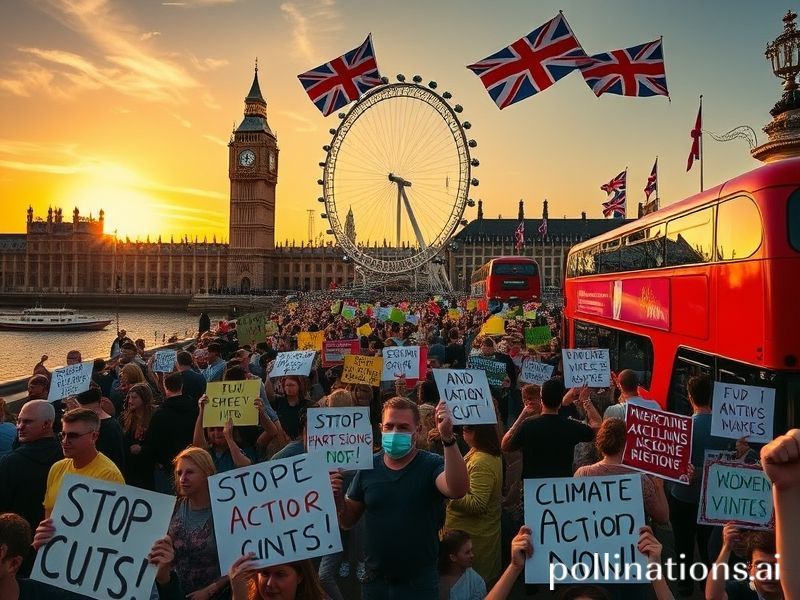London Takes to the Streets Again—World Watches, Snickers, Updates Spreadsheet
The Thames ran a shade more bilious than usual this morning, as if even the river knew it was about to receive another dose of performative outrage. Under a sky the colour of overcooked porridge, thousands converged on Westminster to protest the latest British hobby: the self-inflicted wound. This time the grievance was the freshly passed “Public Order, Sentience and Digital Misery Act (2024)” – a legislative smoothie that blends surveillance, crowd control, and a puzzling clause about compulsory mindfulness classes for anyone caught frowning at a minister.
From a balcony in the Strand, I watched the procession assemble: students with debt-to-income ratios that would make a Greek finance minister blush, pensioners clutching placards that read “I Survived Thatcher – This Is Worse,” and the inevitable Extinction Rebellion samba band whose carbon footprint is at least 30 % irony by weight. Their chants ricocheted off the embassy façades, a multilingual Babel of grievance that made the pigeons look genuinely cosmopolitan.
International correspondents love London protests; they’re the English breakfast of civil unrest—predictable, slightly greasy, and guaranteed to repeat on you. Still, today’s demonstration carries more than the usual quotient of global schadenfreude. In Warsaw, the evening news ran the headline “Foggy Albion Self-Harm Watch, Episode 47.” Brazilian Twitter memed Boris Johnson’s cameo on a milk carton labelled “Missing: Fiscal Responsibility.” Even the New Zealand Herald, a publication usually preoccupied with sheep rankings, found space to tut-tut: “See, this is why we moved the date line.”
Behind the carnival masks and recycled slogans, the protest’s real export is anxiety. The UK has always sold three things to the world: royal weddings, detective dramas, and cautionary tales. Today it’s restocking the third shelf. The new Act grants police powers to designate any march “digitally disruptive,” allowing them to seize phones, drones, and—bafflingly—karaoke machines. The Home Office insists this is vital to stop “algorithmic terrorism,” a phrase that sounds like it was focus-grouped by someone who thinks TikTok is a small percussion instrument. Meanwhile, the Metropolitan Police’s latest crowd-control toy is a Long-Range Acoustic Device that can play “God Save the King” at 150 decibels. Nothing diffuses tension like involuntary monarchist rave.
The geopolitical subplot is tastier than a deep-fried Mars bar. Washington is “monitoring developments closely,” State-Department-speak for “popcorn ready.” The EU, still nursing Brexit heartburn, issued a statement urging “proportionality,” which is Brussels-code for “please collapse quietly so we don’t have to import your chaos.” China’s Global Times ran a cartoon of Big Ben wearing a ball gag labelled “Western values,” an image so on-the-nose it could host its own TED Talk on projection.
And yet, amid the gallows humour and souvenir placards, there is a whisper of something that frightens every capital: contagion. The protest’s Telegram channel already has mirror groups in Lagos, Bogotá, and Seoul, swapping tips on how to jam facial-recognition cameras using nothing but traffic cones and existential despair. The algorithm has no nationality; it simply notices when a hashtag spikes. #StopTheMindfulnessMandate is trending in seven languages, most of them grammatically creative. Somewhere in a Manila call centre, a content moderator is earning 3 USD an hour to delete memes comparing Rishi Sunak to a malfunctioning Roomba—proof that globalisation works, just not for the people doing the work.
By teatime, the march had dissolved into the usual choreography: kettle, kettling, and kettle-based stand-up comedy. A French reporter asked me if this was the British Spring. I told him the British Spring is what happens between the rain at 10:47 and the rain at 11:03. He laughed so hard he forgot to file.
As dusk smeared itself across the skyline, the protesters drifted toward the pubs, because nothing says “down with the oppressive state” like subsidising its alcohol duty. Westminster hosed down the square, washing away chalk slogans and the last pretence of a nation that once exported democracy like it was Earl Grey. Tomorrow the headlines will move on; the Act will stay. And somewhere, a civil servant is already drafting the “Public Order, Sentience and Digital Misery (Amendment) Act (2025),” just to give us all something new to march about.







